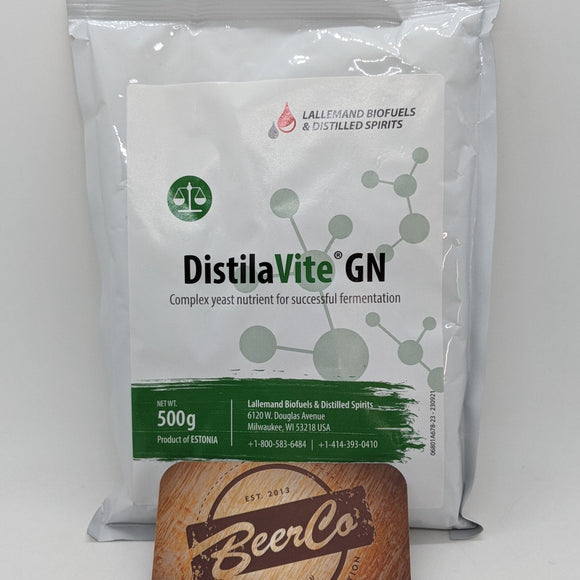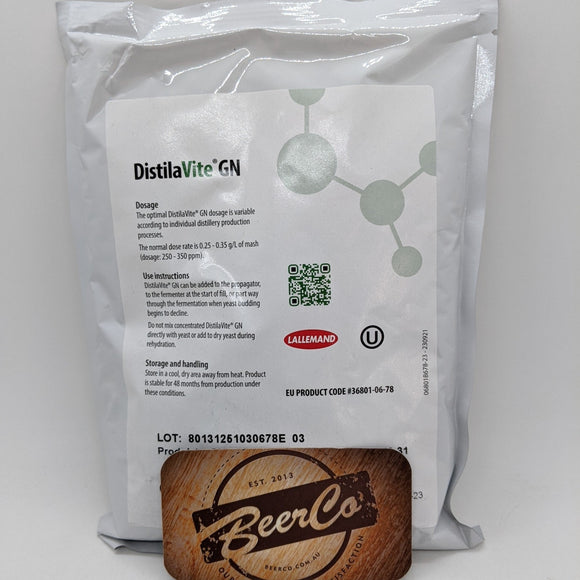DistilaVite® GN is a complete nutrient blend to provide yeast with the correct nutrient balance for growth in beverage alcohol fermentations. It contains a proprietary blend of inorganic nitrogen (diammonium phosphate), organic nitrogen (free amino nitrogen derived from inactivated yeast), and key vitamins and minerals including thiamine, niacin, folic acid, magnesium sulfate and calcium pantothenate.DistilaVite® GN also provides sterols and unsaturated fatty acids, which lend alcohol resistance to the yeast.
Applications:
DistilaVite® GN increases yeast budding and extends the exponential growth phase of yeast during fermentation to result in high yeast concentrations. Yeast consume sugars faster and produce alcohol faster during rapid cell growth, while highest concentration assures more complete utilization of sugars. The net result is more complete and more consistent fermentations, and more optimal alcohol production efficiency. This also helps to insure better consistency in yeast congener production, giving more reliability in flavor formation.
Specifications:
DistilaVite® GN is a free-flowing powder.
Applications:
DistilaVite® GN is suitable for use in grain and sugar-based alcohol fermentations. It provides essential vitamins and minerals needed to extend yeast vitality and viability.
Yeast is a complex living organism and as such needs a balanced nutrient package to deliver high yield and a consistent congener profile. Lallemand Biofuels & Distilled Spirits studied the needs of yeast to propose a specific blended complex yeast nutrient, resulting in DistilaVite® GN.
- DistilaVite GN can be used in beverage alcohol fermentation of various sugar-based feedstocks.
- Variables typically found in molasses can be corrected in part by DistilaVite GN’s specific blend of nutrients therefore assisting distillers to obtain more consistent fermentations.
- DistilaVite GN does not contain any urea.
Characteristics:
DistilaVite GN supplements a series of important nutrients and bi-factors:
- Di-Ammonium phosphate: to ensure the right level of nitrogen.
- Magnesium sulphate: to help yeast develop an alcohol tolerance.
- Inactivated yeast: to absorb natural inhibitors and supply lipids and sterols necessary to yeast.
- Thiamine, folic acid, niacin, biotin and calcium pantothenate: bio-factors for good growth and fermentation.
Directions for use:
The optimal DistilaVite GN dosage is variable according to individual distillery production processes.
- Normal dose rate 0.25 - 0.35 grams per litre of mash (dosage: 250 - 350 ppm).
DistilaVite® GN can be added to the propagator, to the fermentor at start of fill, or part way through the fermentation when yeast budding begins to decline. Use 1 to 2 pounds per 1,000 gallons of mash (12 to 24 grams per hectoliter of mash).
In refined sugar fermentations (cane sugar, fructose syrup, converted pure starch sources), use at higher doses of 8 pounds per 1,000 gallons (100 grams per hectoliter), or at 4 pounds per 1,000 gallons (50 grams per hectoliter) if other external nitrogen sources are added.
Do not mix concentrated DistilaVite® GN directly with yeast or add to dry yeast during rehydration.
Storage and handling:
DistilaVite® GN should be stored in a cool, dry area away from heat for maximum stability. When stored under these conditions, the product is stable for 3 years from the date of manufacture.
Precautions:
Do not inhale dust. Avoid contact with skin or eyes.
Packaging:
- 500g Foil Pack
DistilaVite®
How to get a successful fermentation
During the process of alcoholic fermentation yeast, which is a complex living organism, is subject to various stressors: temperature, ethanol, pH, organic acids and others. In order to get a successful fermentation, yeast needs a balanced nutrient package which will maximize its potential to deliver high alcohol yields and a consistent congener profile.
The first nutrient yeast needs is nitrogen. Nitrogen is naturally present in all the feedstocks we use to produce spirits however, often the natural content is not sufficient or the yeast cannot uptake efficiently or at all . Yeast can uptake ammonium ions, small peptides and α-amino acids except proline . These three sources of nitrogen are collectively referred to as the YAN: Yeast Assimilable Nitrogen. The Free Amino Nitrogen (FAN) only includes α-amino acids and small peptides.
Our studies and other publications on this topic illustrate that a deficiency of nitrogen impacts the yeast growth and can cause slow and sluggish fermentation. In order to manage fermentation properly, it is recommended to use nitrogen in an inorganic (ammonium salts and not urea) or in an organic form. Organic nitrogen has been shown to be effective not only for ensuring efficient fermentation but also to develop and enhance the aromatic potential of the feedstock.
However, yeast is complex and needs other key nutrients such as minerals and vitamins which are necessary to support the enzymes involved in the biochemical reactions of the glycolysis and the fermentation.
To ensure that these other key minerals and vitamins are present we recommend to add complex nutrients. They can be added during the rehydration step using a dedicated nutrient and/or they can be added during the fermentation.
The last issue we have to consider is the feedstock used for the production of distilled spirits. There are two types of feedstocks that have to be managed differently: the first is sugar-based feedstocks (molasses, cane-juice, fruit, etc) and secondly starch-based feedstocks (corn, rye, wheat, barley, etc).
Considering all the different aspects of yeast nutritional requirements during the fermentation, Lallemand Craft Distilling has developed a range of nutrients tailored to the various applications.
- DistilaVite® VM - Lallemand Craft Distilling - Technical Data Sheet
- DistilaVite® VM - Lallemand Craft Distilling - Safety Data Sheet


